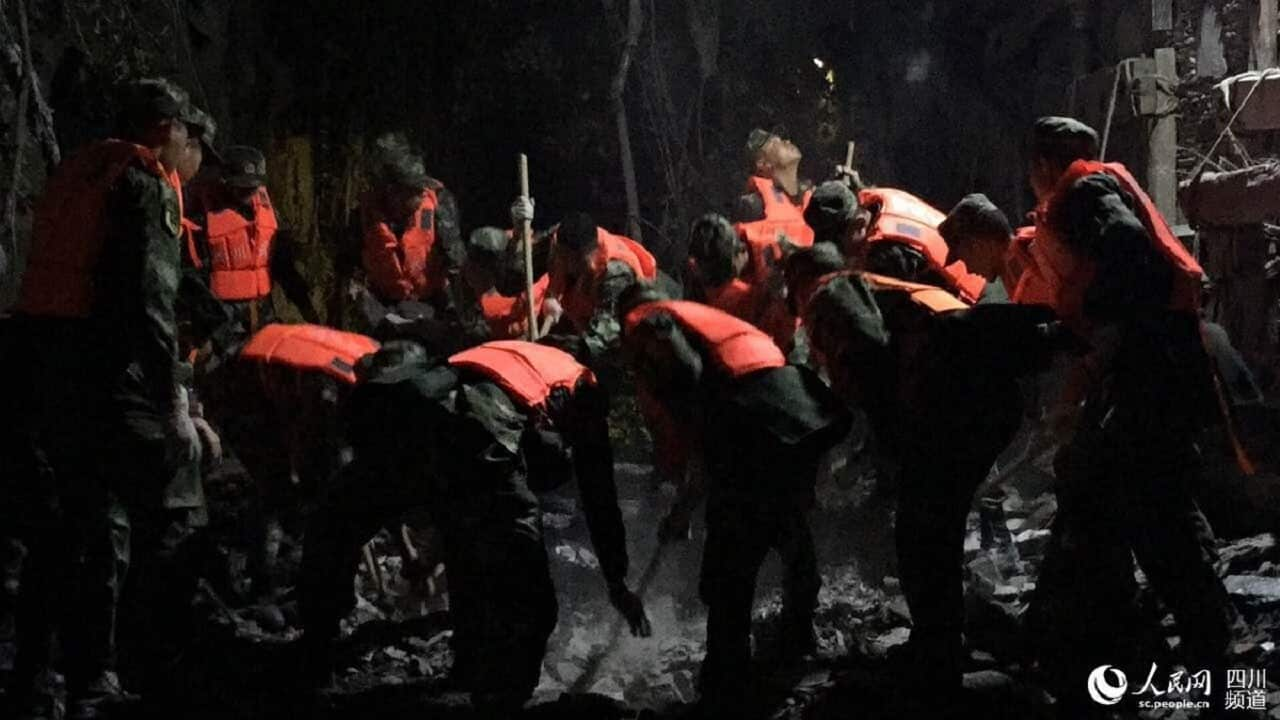The earthquake occurred late Tuesday, killing 12 and leaving 175 injured, 28 of them seriously, according to a statement by the government of Aba prefecture, where the epicentre was located.
But China's National Commission for Disaster Reduction estimated that as many as 100 people may have perished, based on past census data of the sparsely populated region.
Initial images emerging from the quake zone showed paramilitary police searching through rubble for survivors.
Elsewhere, stunned people were seen milling about on debris-strewn streets, fearful of going back inside in case of aftershocks.
At least one aftershock, measured at 4.2 magnitude by the US Geological Survey (USGS), hit the region shortly after the main quake.
Early on Wednesday, a 6.3-magnitude earthquake shook northwest China's Xinjiang region, thousands of kilometres from Sichuan, according to the (USGS).
It struck at around 7.30 am (2330 GMT) and was followed by two aftershocks of 5.2 and 5.3 magnitude, but there were no immediate reports of damage or casualties from the remote area.
The Sichuan temblor was centred near Jiuzhaigou, a valley designated as a national park and UNESCO World Heritage Site and which is famed for its striking scenery, karst rock formations, waterfalls and lakes.
Xinhua said at least five of the deaths occurred in Jiuzhaigou, adding that more than 34,000 people were visiting the popular tourist site at the time.
It said 31,500 tourists had been relocated to safety.
The National Commission for Disaster Reduction estimated that more than 130,000 houses may have been damaged, based on a preliminary analysis of the disaster in Sichuan province.
President Xi Jinping called for "all-out efforts to rapidly organise relief work and rescue the injured people", according to Xinhua.
Restaurant owner Tang Sesheng fled her establishment in Jiuzhaigou town after she felt the earth moving under her.
"I was also in Jiuzhaigou in 2008 during the last big quake, so I knew what it was. This felt even stronger," she told AFP by phone.
She said people had come out of their homes to sit out in the town's large public square, far from any tall structures, afraid to go back inside for fear that buildings might topple.
Many were also sitting in cars, thinking it safer.
"People didn't dare grab anything like money or clothes -- we just all ran outside right away, " she added.
The quake occurred around 9.20 pm (1320 GMT), not far from the site of a massive 8.0-magnitude earthquake that struck in 2008 leaving 87,000 people dead or missing.
Its epicentre was 284 kilometres (176 miles) north of the provincial capital Chengdu and struck at a depth of 10 kilometres, the US Geological Survey said.
The affected region, Jiuzhaigou county, includes one of the country's most famous national parks, a UNESCO World Heritage Site known for karst formations and lakes.
Xinhua said that a landslide at the tourist site left more than 100 visitors trapped, but no deaths or injuries were reported among them.
The People's Daily posted video footage on Twitter reportedly showing tourists cut off in the area lighting a camp fire to keep warm at night.
It also posted photographs of people sleeping under blankets on streets in the area.
More than 38,000 people visited the tourist site on Tuesday, according to the official Xinhua news agency.
Houses collapse
Some houses at the scenic spot collapsed following the quake and authorities were organising young people to help evacuate residents, a staff worker at the park told Xinhua.
Photos from the area posted to social media showed masses of people milling about on streets scattered with light debris, and a taxi dented from being hit by a large boulder.
Over 600 fire officers and soldiers have been deployed, the People's Daily newspaper said.
The Red Cross Society of China said it was deploying emergency specialists and volunteers to assist affected communities.
"The quake hit at night, communications lines and electricity are disrupted and people are no doubt shocked and scared," said Gwendolyn Pang, a spokesperson with the International Federation of Red Cross and Red Crescent Societies in China.
"It may take some time to learn the extent of damage and casualties."
China is regularly hit by earthquakes, especially its mountainous western and southwestern regions.
Earlier today, a landslide triggered by heavy rains killed at least 24 people in a different, mountainous region of Sichuan to the south of Chengdu.

